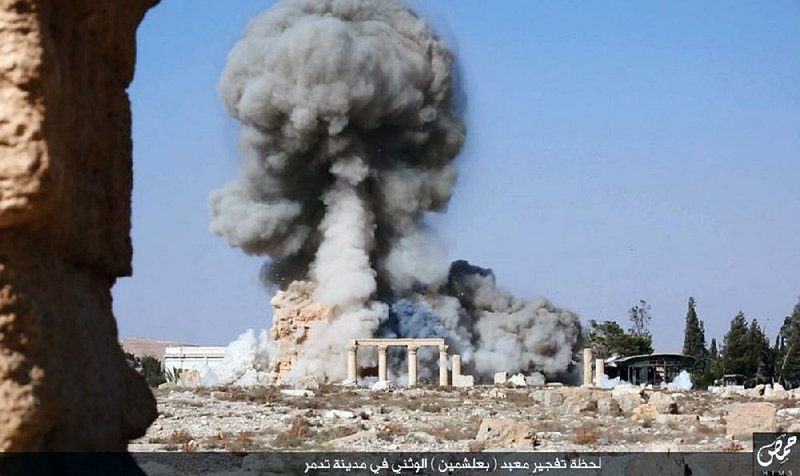BEIRUT -- The Islamic State group released propaganda images Tuesday that purport to show militants blowing up the 2,000-year-old temple of Baalshamin in Syria's ancient caravan city of Palmyra.
The images, posted on social media by supporters of the group, showed militants carrying barrels of explosives, then laying them inside the temple. Other smaller wired cans lay around the temple walls and columns.
Then an image shows a gray plume of smoke rising above the temple from a distance, and another shows the temple reduced to a pile of rocks. One caption read: "The complete destruction of the pagan Baalshamin temple."
The Associated Press could not verify the images. However, they were released like other group propaganda and carried a logo the group often used in the city of Palmyra, in Syria's central Homs province.
The images also corresponded to prior Associated Press reporting. A resident of Palmyra had said the temple was destroyed Sunday, a month after the group's militants booby-trapped it with explosives.
The U.N. cultural agency UNESCO on Monday called the destruction of the temple a war crime.
The temple, a structure of giant stone blocks several stories high fronted by six towering columns, was dedicated to a god of storm and rain -- the name means "Lord of the Heavens." It was part of a sprawling Roman-era complex that includes other remains of temples to local gods and goddesses.
The Islamic State says such ancient relics promote idolatry. It already has blown up several sites in neighboring Iraq, and it is also believed to sell looted antiquities.
The group seized control of Palmyra, in the central deserts of Syria, in May.
In Iraq on Tuesday, security officials said a suicide car bomber killed 13 troops and allied Sunni militiamen near the insurgent-held capital of the western Anbar province.
The officials say the suicide bomber used an army vehicle to approach forces advancing southeast of Ramadi, west of Baghdad, on Tuesday. They say seven people were wounded in the attack.
The officials spoke on condition of anonymity because they were not authorized to speak to the media.
There was no immediate claim of responsibility for the attack, but it bore the hallmarks of the Islamic State, which controls Ramadi and much of the vast Sunni province.
Meanwhile, Iraqi Prime Minister Haider al-Abadi in remarks that aired Tuesday said that winning the battle for control of an oil refinery town north of Baghdad is a key step toward defeating the Islamic State.
"Victory at Beiji is a crucial step toward ending Daesh's presence in Iraq," Haider al-Abadi told military and militia commanders during a visit to the area the day before, using an Arabic acronym for the Islamic State.
The military retook the town of Beiji from the extremists in November, but government forces and allied Shiite militiamen there have come under mounting pressure in recent weeks. Militants now control up to half of the town and the oil refinery to the north, a top commander said.
The oil refinery in Beiji, 155 miles north of Baghdad, has not operated since the Islamic State seized the town as part of its blitz across much of northern and western Iraq in summer 2014. There are no residents left in Beiji. However, control of Beiji gives government forces a key foothold for any future campaign to take back Mosul, Iraq's second-largest city.
Also Tuesday, at least 14 suspected members of a cell that recruited jihadist fighters for the Islamic State in Iraq and Syria were arrested in a joint operation in Morocco and Spain, authorities said.
Morocco's Interior Ministry said 13 people were arrested in raids in several cities across the country, including Nador and Hoceima on the Mediterranean coast close to the Spanish enclave of Melilla, as well as Fez and Casablanca. One of those detained previously had been arrested under the country's anti-terror law.
A Spanish Interior Ministry statement said one person was arrested in the central town of San Martin de la Vega, just southeast of Madrid. It said the members of the group, whose leader was among those detained, maintained close contact with each other in Melilla.
Both ministries said the network was aimed at recruiting fighters for the Islamic State to fight in Syria and Iraq and also to carry out Islamic State-type actions in Morocco and Spain.
Information for this article was contributed by Paul Schemm, Ciaran Giles and Qassim Abdul-Zahra of The Associated Press.
A Section on 08/26/2015


